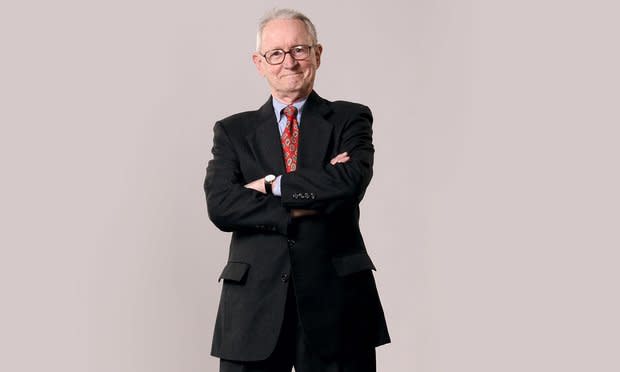Former 3rd Circuit Judge John J. Gibbons Dead at 94

John J. Gibbons/courtesy photo
John J. Gibbons, former chief judge of the U.S. Court of Appeals for the Third Circuit and a leader at the Newark law firm that bears his name, died on Dec. 9. He was 94.
Gibbons' legal career spanned 65 years and included human rights advocacy.
He and other former federal jurists from New Jersey in 2004 filed briefs to the U.S. Supreme Court opposing the detention, without judicial review, of 660 men held at the Guantánamo Bay Naval Base in Cuba. The court decided in favor of the detainees. Speaking of the detentions at Guantanamo, Gibbons told the New Jersey Law Journal in 2004, “It’s clear that what they were doing was intentionally creating a black hole where they could get away with everything, with the public never even knowing.”
And during and after the Newark riots in 1967 and 1968, Gibbons, then New Jersey State Bar Association president, recruited attorneys to work with unrepresented parties.
Patrick Dunican Jr., managing partner of the eponymous Newark-based firm, said in a statement that Gibbons “played a lot of roles here at the firm that bears his name: role model, teacher, mentor, friend, and hero.
“He was a quiet, soft-spoken legal rock star who walked among the giants in our profession and, in the process, became one of the biggest,” Dunican added.
Gibbons, born in Newark and raised in Belleville, served in the U.S. Navy from 1943 to 1946.
After graduating from Harvard Law School in 1950, he joined Crummy & Considine, predecessor to the Gibbons firm. In January 1970, he was appointed by President Richard M. Nixon to the Third Circuit, and sat on the court for 20 years, including the last three years as chief judge.
According to the firm, he wrote upward of 800 opinions during his tenure.
He then taught full time at Seton Hall University School of Law.
In April 1990, he rejoined the firm, then known as Crummy, Del Deo, Dolan, Griffinger & Vecchione. Gibbons' name was added to the firm, thereafter, and in 2007 the firm was renamed to bear only his name: Gibbons, an Am Law 200 firm that currently has roughly 175 lawyers in six offices.
The year Gibbons rejoined the firm, in 1990, it launched the John J. Gibbons Fellowship in Public Interest and Constitutional Law, and staffed it with two full-time attorneys handling public interest and constitutional law matters free of charge to litigants. Gibbons directed the fellowship, which took issues on same-sex marriage, Megan's Law and racial profiling on the New Jersey Turnpike. The program's lawyers also represented students in urban school districts in connection with the landmark Abbott v. Burke litigation.
Gibbons also worked to abolish the death penalty in New Jersey, in court and beyond. Gibbons in 2000 represented death row inmate Terry Williams before the U.S. Supreme Court on a habeas corpus petition. The court ruled in Williams's favor, holding that he had been deprived of the effective assistance of counsel. Gibbons was on the executive committee of New Jerseyans for an Alternative to the Death Penalty, and testified before the New Jersey Death Penalty Study Commission in 2006 that "a sentence of death is in reality a sentence to incarceration in death row for decades, with the threat of execution overhanging the prisoner at all times, and the prolongation of painful uncertainty for the families of victims."
Gibbons received a lifetime achievement award from The American Lawyer in 2005, and was named one of the 100 most influential lawyers in America by The National Law Journal in 2006, and named lawyer of the year by the New Jersey Law Journal in 2004.
He was active with the American Bar Association, too, including as a member of the House of Delegates and chairman of the Committee on Fair Trial and Free Press.
He earned his LL.B. cum laude from Harvard Law School, and his bachelor's degree from the College of the Holy Cross in 1947.
Dunican of Gibbons added, “We were all blessed to have known the Judge, worked with the Judge, and learned from the Judge. We are grateful for all he accomplished. He leaves behind an enormous legacy and a challenge to all of us to continue to honor his memory.”


